| See Issue Online | Archive |

|
|
November 2012 | Issue 63
|
Forward to a Friend |
Subscribe
|
Dear <<First Name>>,
At the World Parrot Trust our aim is to protect parrots, both wild and companion birds. This month in Flock Talk our focus is on three of them, all endangered wild parrots, which we have worked with for many years. We've dubbed them the WPT 3: the Blue-throated Macaw, the Yellow-crested Cockatoo, and the Great Green Macaw. The WPT 3 is struggling. But there is much reason for hope - with our people and partners working in the field and loyal supporters like you, these three species have a chance to survive!
To that end, we'd like to share a bit about them: their stories, the people who are fighting tooth and nail for them, and what the Trust is doing to secure their futures. So read on, and delve into the world of Blue-throated Macaws, Great Green Macaws and Yellow-crested Cockatoos - our WPT 3.
Happy reading,
Desi Milpacher, Flock Talk editor

In This Issue
Introducing the WPT 3
A bit of history
|

|
Our WPT 3 - the Blue-throated Macaw, Great Green Macaw and Yellow-crested Cockatoo - have all earned the terrible distinction of being among the most endangered birds in the world. This is due to a series of issues that have troubled them historically and continue to plague them today: capture for the wild bird trade, habitat loss and destruction, reproductive failure and persecution by humans. In these articles from Flock Talk's companion publication PsittaScene, we'll explore the trials, tribulations and triumphs of the people and parrots on the front lines of the preservation of these species.
10 Years: Blue-throated Macaw (PDF) »
Few and Far Between: Saving the Yellow-crested Cockatoo (PDF) »
Perfect 10: Great Green Macaw (PDF) »
|
Save the WPT 3
Saving Three Parrot Species: As Easy As I-2-3
|
There are some very special birds that are at risk for extinction. Blue-throated Macaws, Yellow-crested Cockatoos and Great Green Macaws are endangered in the wild, all with populations of fewer than 1000 each. In the case of the Blue-throated Macaw, it's worse. There's less than 150 left.
But not all is lost. The World Parrot Trust has been working with in-country partners and WPT researchers to help these species for years now. We've been supporting conservation actions such as: Identifying / eliminating threats to wild populations, implementing habitat protection measures, working to stop the wild bird trade, supporting wild nests and chicks, increasing nest site availability, releasing captive-raised birds into protected areas, and raising awareness about the value, both culturally and ecologically, of these birds.
There's a lot of work to be done. And In 2013 WPT is stepping up these efforts, but we'll need your help to do it! It's as easy as...1-2-3. Make ONE donation. Because of generous matching donors your donation is multiplied by TWO. And it helps THREE species!
Please join us to help save the Blue-throated Macaw, the Yellow-crested Cockatoo, and the Great Green Macaw. You'll be glad you did, and you'll become an important conservation partner in saving these species!
Help save the WPT 3!
Donate today »
|
Species Profile:
Yellow-crested Cockatoo
|
Genus: Cacatua
Species: sulphurea
World Population: Fewer than 1,000.
Range: C.s. sulphurea: Sulawesi and Pasoso;
C.s. parvula: Across Nusa Tenggara, with largest population on Komodo/Rinca Islands; also Timor Leste;
C.s. abbotti: Restricted to Masakambing Island, in Java Sea;
C.s. citrinocristata: Restricted to Sumba in Lesser Sunda Islands.
Ecology: Usually encountered in pairs or small groups of up to ten birds. Larger flocks will gather to feed in fruiting trees. Are noisy and conspicuous. Groups leaving roosting areas in the mountains will fly down to lower elevations to feed. Loves to rain-bathe. Eats seeds, fruit, berries, flowers and nuts.
Habitat: Found up to 1200m (3936ft). Occurs in forest edge, woodland, farmland coconut palms, semi-arid areas and forest.
Threat Summary: Unsustainable trapping for wild bird trade.
IUCN/CITES Rating:Critically endangered, Appendix I
Learn more about the Yellow-crested Cockatoo »
|

|
Gift Giving Ideas: Arpilleras
Local Artwork Support Clay Lick Conservation

|
You can support parrot conservation and encourage sustainable development in one of the wildest areas of the Peruvian Amazon when you purchase a stunning Arpillera from the World Parrot Trust.
Arpilleras are hand-sewn wall hangings created by indigenous artisans in Sepahua, Peru. With intricate detail and vivid colours, these unique art pieces depict rainforest, cultural and community themes.
But the most amazing part of the story is that your purchase of these Arpilleras supports the livelihoods of native peoples, who in return protect special clay licks used by parrots -- an arrangement that benefits parrots and humans alike.
Learn more about how this special effort is helping to save Amazons, parakeets and more in Peru.
Read the full story (PDF) »
To order, please visit:
USA eStore »
UK/World eStore »
|
Ask an Expert: Dr. Brian Speer, DVM
Foot problems in a Goliath Palm Cockatoo
|
WPT Expert Dr. Brian Speer, DVM addresses the painful problem of skin cracking and lesions on a Palm Cockatoo's foot.
Read his answer »
|
|
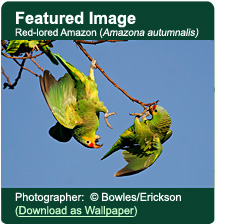



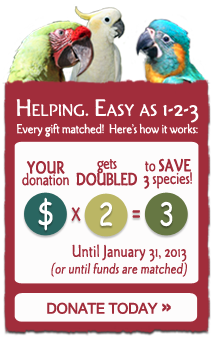
 |  | Test Your Parrot IQ
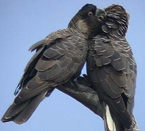
1. This bird is one of four black cockatoos found in Australia. Name it.
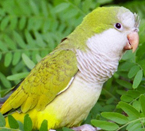
2. This parrot is found in South America and parts of the US. What is it?
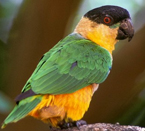
3. This species is gregarious and boisterous. What is it?
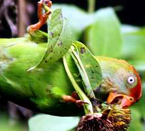
4. This parrot belongs to the genus Loriculus. Name it.
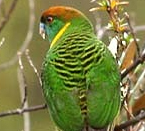
5. This striking parrot is one of the least known. What is it?
(Click photos above for
the answers.)
For more information »
Also visit our photostream
at Flickr »
|
 |

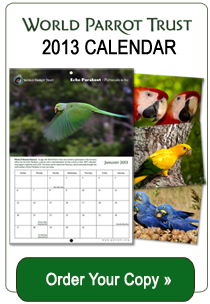
|
|
WPT Partner:
Natural Encounters Conservation Fund
|
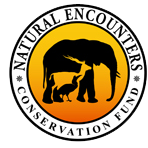 A big thank you to WPT partner Steve Martin's Natural Encounters, Inc. (NEI) and the World of Birds Show, which have been in operation since 1976. Since its founding Steve has wanted to help people understand the issues facing endangered birds through his shows and presentations. Additionally, under the umbrella of NEI, Natural Encounters Conservation Fund (NECF) has raised funds to aid in many projects, with one hundred percent of the proceeds going directly to the conservation projects it supports.
A big thank you to WPT partner Steve Martin's Natural Encounters, Inc. (NEI) and the World of Birds Show, which have been in operation since 1976. Since its founding Steve has wanted to help people understand the issues facing endangered birds through his shows and presentations. Additionally, under the umbrella of NEI, Natural Encounters Conservation Fund (NECF) has raised funds to aid in many projects, with one hundred percent of the proceeds going directly to the conservation projects it supports.
Steve became aware of the World Parrot Trust many years ago. After a series of conversations with WPT founder Mike Reynolds he joined the Trust eventually becoming a Trustee, and has been a staunch supporter ever since. His main focus for the Trust has been the conservation of the critically endangered Blue-throated Macaw, one of the WPT-3. He's been supporting this critically endangered species through donations and has acquired the two groups of macaws, housing them and breeding them for eventual release into their native Bolivia. Amazing work!
Visit Natural Encounters » |
Events and Other Good Things
Creative people supporting parrots
|
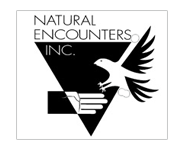 NEI Workshop Series: NEI Workshop Series:
Contemporary Animal Training and Management
Designed for professional zoo keepers, trainers, and wildlife educators, this comprehensive 5-day workshop led by Steve Martin and Susan Friedman Ph.D teaches the core scientific principles of behaviour needed to train operant behaviors efficiently and humanely. With extensive classroom instruction and hands-on training experiences, students who complete this workshop will be better able to meet even the most complex training challenges, provide more enriching animal environments, and design educational programs that inspire the next generation of keepers, trainers and conservationists.
Date: January 12-17, 2013
Location: Natural Encounters, Winter Haven, FL, USA
Cost: $1500 per person ($100 per person discount for Susan Friedman's LLP/LLA graduates, or multiple attendees from the same institution.)
Learn More/Register: http://www.naturalencounters.com/
NEI Workshop Series:
Behavior Apps: Training with Art and Science
Under the leadership of Steve Martin and Susan Friedman, Ph.D, this 5-day workshop designed for companion parrot owners offers a balance of insightful lectures and hands-on experience with several birds from our extensive collection, providing the ideal setting to accommodate various training skill levels. Students who complete this workshop will be better able to modify even the most challenging behaviours, provide more enriching animal environments, and create more positive relationships with their companion parrots.
Date: February 2 - 7, 2013
Location: Natural Encounters, Winter Haven, FL, USA
Cost: $1500 per person ($100 discount for Susan Friedman's LLP/LLA graduates, or return attendees)
Learn More/Register: http://www.naturalencounters.com/
For more event listings, visit the WPT website at:
http://www.parrots.org/index.php/parrotnews/Events/
|
Want to submit a story?
We welcome contributed articles. For more information, please see our writer guidelines or contact us at flocktalk@worldparrottrust.org.
Want to reprint a story?
No material in this publication may be reproduced without permission from the World Parrot Trust. To request permission contact us at flocktalk@worldparrottrust.org.
Comments?
Please contact us at flocktalk@worldparrottrust.org.
Remember to add flocktalk@worldparrottrust.org to your address book or safe senders list.
|
|
Update your profile |
Forward to a friend |
Unsubscribe
WPT Online | Donate | Shop |
Privacy Policy | Disclaimer | Contact | About
|
|
© 2012 The World Parrot Trust | Glanmor House Hayle, Cornwall TR27 4HB
|
|



|
|



















 A big thank you to WPT partner Steve Martin's Natural Encounters, Inc. (NEI) and the World of Birds Show, which have been in operation since 1976. Since its founding Steve has wanted to help people understand the issues facing endangered birds through his shows and presentations. Additionally, under the umbrella of NEI, Natural Encounters Conservation Fund (NECF) has raised funds to aid in many projects, with one hundred percent of the proceeds going directly to the conservation projects it supports.
A big thank you to WPT partner Steve Martin's Natural Encounters, Inc. (NEI) and the World of Birds Show, which have been in operation since 1976. Since its founding Steve has wanted to help people understand the issues facing endangered birds through his shows and presentations. Additionally, under the umbrella of NEI, Natural Encounters Conservation Fund (NECF) has raised funds to aid in many projects, with one hundred percent of the proceeds going directly to the conservation projects it supports.
 NEI Workshop Series:
NEI Workshop Series: